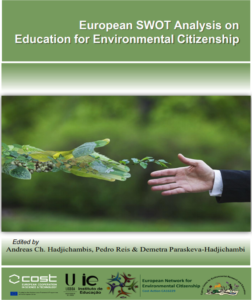Chapter 7: Education for Environmental Citizenship in CYPRUS: A SWOT Analysis
Andreas Ch. Hadjichambis & Demetra Paraskeva-Hadjichambi
Abstract: This chapter attempts to consolidate the views of experts in the area of education for the environment in Cyprus, concerning the Strengths, Weakness, Opportunities and Threats (SWOT) of Education for Environmental Citizenship. Six participants – academics, researchers, teachers, Ministry of Education officers and NGOs, answered the structured questionnaire. Education for Environmental Citizenship is perceived to be advantageous (Strengths) in two main dimensions. The first refers to students’ personal development contributing to the development of critical thinking, problem-solving and decision-making skills as well as in students’ empowerment for civic participation, inter-generational justice and action competence in the public sphere. The second dimension includes the importance of methodologies adopted which are integrated in a holistic and comprehensive pedagogy. Weaknesses and areas for improvement include issues related to the novelty of Education for Environmental Citizenship, advocating the need for teachers’ education and motivation, the development of learning materials and best practices as well as the mitigation of educational system’s resistance to change. Education for Environmental Citizenship provides many Opportunities for promoting civic engagement through activities in local communities, enhancing NGO activities for non-formal education, advocating education policies on National and European levels, as well as the enabling of international networking. The main Threats related to Education for Environmental Citizenship are considered to be the lack of educational methodology and approaches, teacher-related aspects, learning materials, economic and infrastructure issues.

